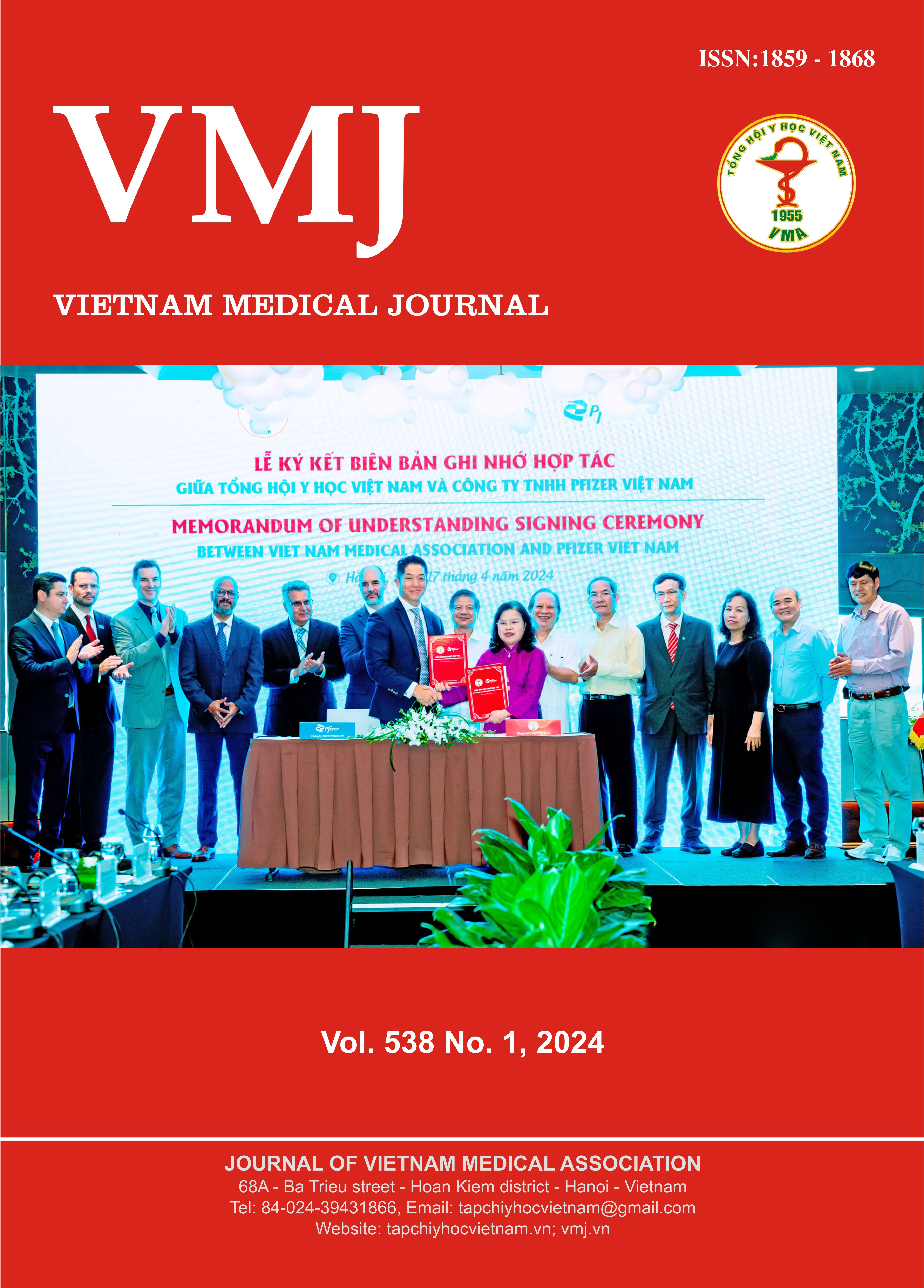PHYSICIANS’ PERCEPTION AND ADHERENCE TO CLINICAL GUIDELINES FOR THE MANAGEMENT OF ACUTE CORONARY SYNDROME IN VIETNAMESE HOSPITALS
Nội dung chính của bài viết
Tóm tắt
Introduction: Understanding guideline acceptance related factors and barriers to guideline adoption may help improve guideline implementation. We aimed to investigate physicians’ perception and adherence to ACS guidelines in Vietnamese hospitals. Methods: This was a cross-sectional study. Physicians’ perception was collected through interviews, using a validated questionnaire. Physicians’ adherence to ACS guidelines was determined through medical records of ACS patients treated by interviewed doctors, using prescribing indicators. Data were analyzed using SPSS 20.0, with significant level of p < 0.05. Results: There were 33 cardiologists completed the interview (mean age 36.4, male 57.6%). Majority of physicians perceived that ACS guidelines were useful, reliable, and available. They definitely understood, would keep updating, and implementing those guidelines. About a third of physicians supposed that guideline adherence did not save treatment costs. Major barrier was lack of health insurance coverage. A total of 342 medical records of ACS patients (mean age 65.3, male 59.1%) was reviewed for physicians’ adherence. Patients with unstable angina/non-ST-elevation myocardial infarction accounted for the largest proportion. Statins were predominantly indicated (in 96.4% of patients), followed by aspirin (89.9%), ACEIs/ARBs (86.3%), P2Y12 inhibitors (84.7%), and beta-blockers (59.5%). Ultimately, 52.2% of patients were prescribed all four recommended medications. No differences in physicians’ characteristics, perception and barriers to guideline between high- and low-adherence doctors were found. Conclusions: Majority of physicians had positive perception towards ACS guidelines, but there were still certain barriers. Physicians’ prescribing practice was highly consistent with the guidelines, but the indication of beta-blockers and all four recommended medications were limited.
Chi tiết bài viết
Từ khóa
Physicians’ perception; guideline adherence; acute coronary syndromes
Tài liệu tham khảo
2. Nguyen T, Nguyen TH, Pham HT, Nguyen TT, Huynh KM, Vo PT, at al. Physicians' adherence to acute coronary syndrome prescribing guidelines in Vietnamese hospital practice: a cross‐sectional study. Tropical Medicine & International Health. 2015 May;20(5):627-37.
3. QNN Tran, MTT Vo, KK Le, HT Nguyen, T Nguyen. Physicians’ Viewpoints and Practical Implementations of Vietnam National Heart Association Guidelines for Acute Coronary Syndrome Management. Journal of Vietnamese Cardiology. 2019; 87 (1): 88-96.
4. MTT Vo, KM Huynh, TH Pham, T Nguyen, HT Nguyen. Development and validation of a questionnaire about physicians’ perception in the implementation of acute coronary syndromes guidelines. Ho Chi Minh City Journal of Medicine. 2019; 23 (6): 132 - 137.
5. Carlsen B, Bringedal B. Attitudes to clinical guidelines—do GPs differ from other medical doctors?. BMJ Quality & Safety. 2011 Feb 1;20(2):158-62.
6. Kasje WN, Denig P, De Graeff PA, Haaijer-Ruskamp FM. Physicians’ views on joint treatment guidelines for primary and secondary care. International Journal for Quality in Health Care. 2004 Jun 1;16(3):229-36.
7. Reiner Ž, Sonicki Z, Tedeschi-Reiner E. Physicians’ perception, knowledge and awareness of cardiovascular risk factors and adherence to prevention guidelines: the PERCRO-DOC survey. Atherosclerosis. 2010 Dec 1;213(2):598-603.
8. The Vietnamese Ministry of Health, Decision 30/2018/TT-BYT dated October 30, 2018 of Minister of Health on promulgating the professional document “Issuing list and payment rates and conditions for pharmaceutical medicines, biological products, radioactive medicines and tracers under the scope of benefits of health insurance participants”, 2018.
9. Adeodu A, Agius R, Madan I. Attitudes and barriers to evidence-based guidelines among UK occupational physicians. Occupational medicine. 2009 Dec 1;59(8):586-92.
10. Tra J, Van der Wulp I, Appelman Y, de Bruijne MC, Wagner C. Adherence to guidelines for the prescription of secondary prevention medication at hospital discharge after acute coronary syndrome: a multicentre study. Netherlands Heart Journal. 2015 Apr; 23:214-21.
11. Radwan M, Akbari Sari A, Rashidian A, Takian A, Abou-Dagga S, Elsous A. Attitudes of Palestinian health-care professionals in Gaza to clinical practice guideline for diagnosis and treatment of diabetes mellitus. Frontiers in endocrinology. 2017 Oct 31; 8:288.


